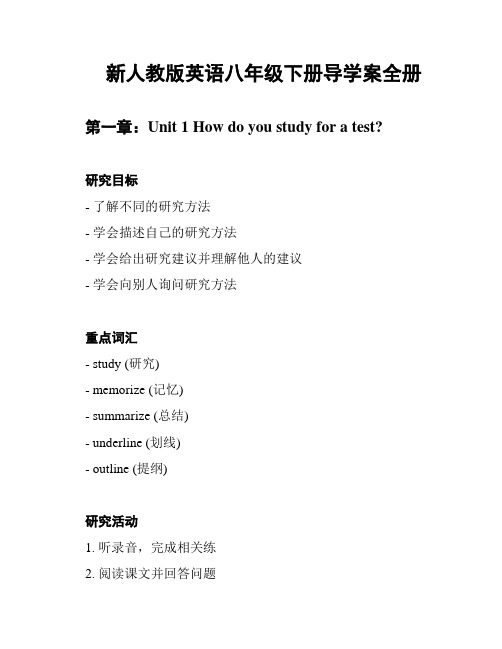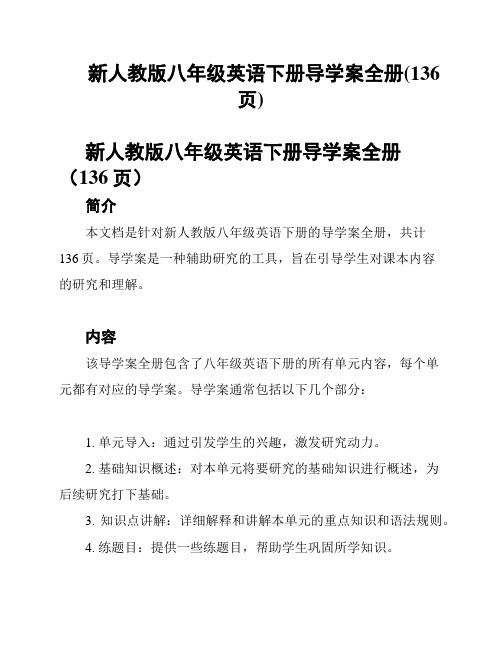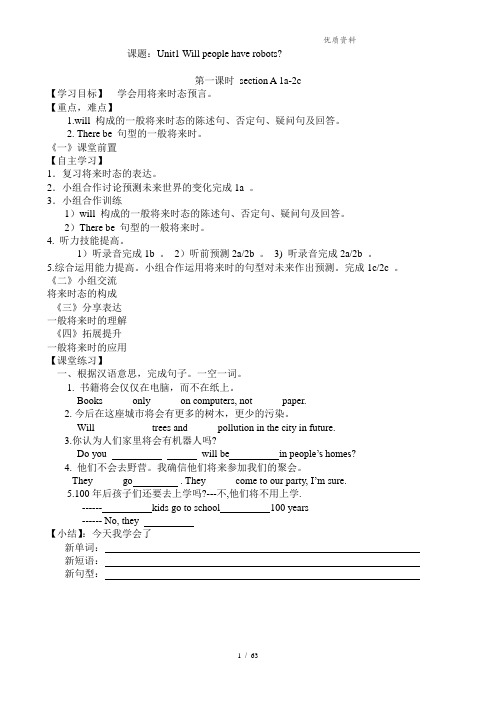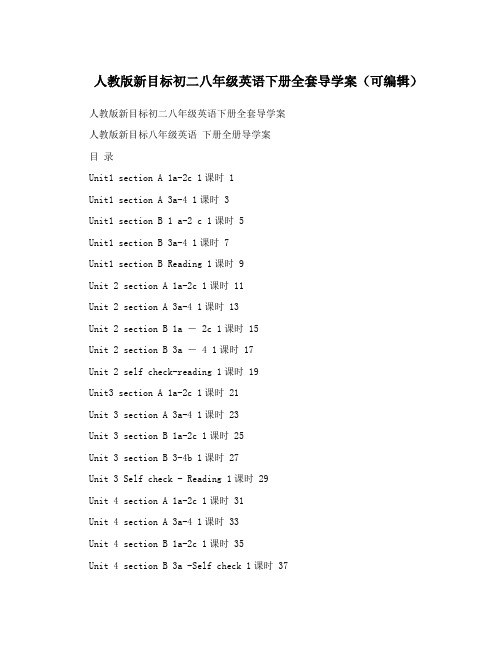人教版英语八下导学案
人教版八年级下册英语导学案

Unit1 Will people have robots?Section A period 1 (1a-1c)主备人:曾丝秀审核人:初二英语备课组学习目标:1、学会拼写单词will,robot,everything,paper和won’t2、学会运用will 表示一般将来时和能用will和won’t写出表将来的句型3、创设情景,让学生简单预测自己的未来学习方法:Reading,Listening and writing学习流程及措施:一、预习自学(一)通过预习,完成下列单词和词组的拼写1、将、会;要________2、机器人_________3、每件事情______4、纸,纸张_______5、在人们的家里_____________6、有个机器人__________7、在家通过电脑学习__________8、活到100岁__________9、在五年后__________10、在纸上________(二)根据首字母及句意完成单词1)R______ can do many things for people.2) There are some pieces of p______ on the desk,and you can write on them.3) E_____ is ready .Let’s begin.4) He u____ a pen to write.5)There will be more and more tall b______ in our city.二、研讨一)通过预习完成下列句子1、人们家中将有机器人。
People _____- ______ ______ in their homes.2、人们将不再用钱,每样东西都是免费的People ____ _____ ______. Everything____ ______ _____.3、将来书只在电脑上出现,而不会在纸上.Books _____ ____ ______ on computer, not _____ ______.4、孩子们将不去上学,他们将在家中通过电脑学习。
人教版英语八年级下册导学案

Unit4Section A一、学习目标:1) Important words: mad, anymore, message, suppose, hard-working2) Important phrases: watch soap operas, be supposed to do, first of all, pass on, sth. happen on …3) Important Sentences①She said she was mad at Marcia. ②She said she was having a party for Lana.③What happened on “Young Lives” last night? ④You are supposed to meet at the bus stop to return it.4) Grammar: 直接引语和间接引语二、学法指导:运用任务型学习,驱动学生掌握直接引语与间接引语之间的转化三、学习过程:Step1自学单元语法:(直接引语和间接引语)(一) 直接引语和间接引语的含义:引述别人的话时,一般采用两种形式:一是引用别人的原话,两边用引号标出,称为直接引语;二是用自己的语言转述别人的话,称为间接引语。
间接引语在句中实际上就是宾语从句。
(二) 直接引语变间接引语的方法:1.从句人称的变化:由直接引语变间接引语时,从句的主语人称要遵循一主、二宾、三不变的原则。
1)直接引语的主语是第一人称时,变为间接引语时要和主句的主语保持一致。
2)eg:①They said,“We will go there by bus”。
→They said they would go there by bus.3)②He said,“I am visiting my aunt next week.”→He said that he was visiting his aunt next week.2)如果直接引语的主语是第二人称,变为间接引语时要与主句的宾语保持一致。
人教版英语八年级下册全册精美导学案(共97页)

撰写人:Unit 1 What’s the matter?Section A 1a-2c 第1课时【学习目标】1.能听说读写重点单词和词组:matter, sore, have a cold, stomachache, have a stomachache, foot, neck, stomach, throat, fever, lie, lie down, rest, cough, X-ray, toothache, take one’s temperature,see a dentist2.句型:学会用What’s the matter? I have a cold. I have a stomachache. I have a sore back. I have a sore throat. 谈论身体情况。
3. 学习用should 给出建议【重点】【难点】能询问并表述身体的种种不适以及对他人身体的种种不适给予适当的建议。
【自学指导】1、自己认读1a单词,与画面中字母匹配,并在自己的身体上指认人体部位。
2、对照单词表翻译1a画面上的句子,并读熟。
5min (5分钟)【自学检测】1、把你所知道的身体部位的单词写下来,并写出其相应的中文意思。
__eye_ __眼睛_ ______ ______ ______ ______ ______ ____________ ______ ______ ______ ______ ______ ______ ____________ ______ ______ ______ ______ ______ ______ ____________ ______ ______ ______ ______ ______ ______ ______2、have a cold的意思是“感冒,着凉”为固定词组,have 表示生…病,解释下列词组的意思。
have a sore throat _________ have a sore neck ___________have a fever ____________ have a headache ____________have a stomachache ________ have a toothache __________【合作探究】1、What’s the matter?怎么了,其后常与介词with 连用。
新人教版英语八年级下册导学案全册

新人教版英语八年级下册导学案全册第一章:Unit 1 How do you study for a test?研究目标- 了解不同的研究方法- 学会描述自己的研究方法- 学会给出研究建议并理解他人的建议- 学会向别人询问研究方法重点词汇- study (研究)- memorize (记忆)- summarize (总结)- underline (划线)- outline (提纲)研究活动1. 听录音,完成相关练2. 阅读课文并回答问题3. 观看视频,了解不同的研究方法4. 小组讨论:描述自己的研究方法并给予建议5. 打开研究社区网站,询问他人研究方法拓展活动- 编写一篇短文介绍自己最有效的研究方法,并分享给同学们。
第二章:Unit 2 I used to be afraid of the dark.研究目标- 理解和使用used to的用法- 描述过去和现在的变化- 研究如何克服恐惧并充满勇气- 学会给予鼓励和支持重点词汇- used to (过去常常)- frightened (害怕的)- courage (勇气)- encourage (鼓励)研究活动1. 阅读课文,了解主人公的变化2. 讨论在生活中的变化和克服恐惧的经历3. 观看鼓励和支持的视频4. 小组活动:给予同组成员鼓励和支持5. 与语伴进行练,描述自己的变化和克服恐惧的经历拓展活动- 编写一篇故事,描述一个人如何克服恐惧并变得勇敢,并与同学们分享。
(以下章节内容省略)总结本册教材主要围绕研究方法和个人成长展开。
通过研究不同的研究方法和分享个人经验,学生可以提高研究效果并培养勇气与自信。
同时,通过鼓励和支持他人,学生也能积极参与集体活动。
对于学生们来说,在实践中运用所学知识,并与他人互动,是提高英语能力和培养社交技巧的重要途径。
希望同学们能够积极参与课堂活动,享受研究的乐趣,不断提升自我。
*以上为大致导学案内容,具体根据教材内容进行调整与完善。
新人教版八年级下册英语导学案

新人教版八年级下册英语导学案第一课时教学目标- 研究询问身体状况的表达方式- 研究身体部位的名称及其常见问题- 能够在实际情境中运用所学知识进行交流教学重点- 身体状况的表达方式- 身体部位名称与问题的对应关系教学难点- 在实际情境中灵活运用所学语言进行交流教学准备- PPT课件- 视频资源: "Asking about Health"、"Parts of the Body"- 板书教学过程1. 进入主题- 教师播放"You Are My Sunshine"音乐视频,让学生欣赏音乐,培养学生研究英语的兴趣和热情。
- 引入话题:"How do you feel today? Are you feeling good or bad? Do you have any problems with your health?"2. 研究表达方式- 教师通过PPT呈现"How are you feeling today?"、"What's the matter?"等表达方式,并通过板书加以强调和解释。
3. 研究身体部位名称与问题对应关系- 教师播放"Parts of the Body"视频,让学生研究身体部位名称及其常见问题。
- 教师与学生一起进行问答对话练,运用"What's the matter with ...?"、"Is there something wrong with ...?"等表达方式,巩固所学知识。
4. 情境交际- 教师以生活场景为背景,设计实际对话情境,让学生运用所学语言进行交流。
5. 课堂小结- 教师进行课堂小结并强调本节课要点,让学生对所学知识进行巩固。
第二课时教学目标- 研究询问及表述自己所喜欢的事物- 研究运用形容词描述物品或场景- 能够在实际情境中运用所学知识进行交流教学重点- 运用表达喜好的句型- 形容词的使用及其修饰对象教学难点- 运用所学语言进行情境交际教学准备- PPT课件- 视频资源:"Likes and Dislikes"、"Adjectives"- 板书教学过程1. 进入主题- 教师通过PPT呈现"I Love English"主题,并引导学生回答"I love ...",培养学生研究英语的兴趣和热情。
八下英语导学案人教版答案

八下英语导学案人教版答案Unit 1Times are ChangingⅠ. go well with 2. meet up with 3. called on 4. fly up 5. on the wayⅡ. 1. What 2. How 3. How often 4. How many 5.Who/WhoeverⅢ.1-5D B C A E 6-10F J G I HⅣ. 1-5C E D B AⅤ. 1. on display 2. had better 3. brought back 4. to give away 5. to play withⅥ. 1. does; enjoy 2. Did; hear 3. doesn’t; talk 4. Did; travelⅦ. 1. take off 2. make a speech 3. show off 4. join in 5. run afterⅧ. 2. on display 3. ran after 4. is changing 5. saw offUnit 2Lessons from the PastⅢ.1-5B D F A C 6-10H G E K JⅣ.is known for; being 2. are proud of 3. were led by 4. have been; since 5. Often; surprisesⅤ. 1. according to 2. take up 3. so that 4. besides5. make upⅦ. 1. whether; or 2. neither; nor 3. both; and 4. not only; but alsoⅧ. | 不同凡舞的 | 经历; 在战争中; 为; 胜利; 而战Ⅸ. 1. fought against 2. besides 3. both; and 4. neither; nor 5. Not only; but alsoUnit 3CommunicationⅡ. 1. How tall 2. What kind of 3. How many;are there 4. What color 5. How muchⅢ.1-5A D E B C 6-10I G H F JⅤ. 1. by;living 2. by; learning 3. It; possible; get 4. as; possible 5. after; goingⅥ. 1. was trying; failed 2. were chatting 3. makes; laugh 4. doesn’t; writeⅦ. 1. starts up 2. looked up to 3. turn down 4. come up with 5. looking forⅧ. 1. are chatting 2. gives up 3. looked up 4. come up withUnit 4Wildlife ProtectionⅠ. 1. put off 2. came up with 3. sign up (for) 4. make up 5. work outⅡ. 1. 和 . . . . . . 在一起; 2. 拥抱自然; 3. 在未来; 4. 长至; 5. 产生危险Ⅲ. 2. separated; from 1. grow up 3. protecting; from 4. welcomed; into 5. inspired; withⅣ. 1-5D E C A BⅤ. 1. to give up 2. taking care of 3. to make up 4. give away 5. bringing backⅥ. 1. asked; to follow; refused 2. is planning ; will start 3. was told ; not to go 4. wanted; to go, toldⅦ. 1. make up 2. looking after 3. go over 4. take care of 5. give awayⅧ. 2. took care of 3. give up 4. looked afterUnit 5FilmsⅢ. 1-5A B C D FⅣ. 1. are enjoyed by 2. as; as 3. The more; the more 4. would rather; than 5. So; thatⅤ. 1. are; taken 2. is being; looked 3. is used 4. to entertain 5. to makeⅥ. 1. were being watched 2. enjoy;playing 3. are; taught / have; taught 4. is known; meanⅦ. 1. turned down 2. made up 3. take off 4. keep on 5. went offⅧ. 1. are being taught 2. turned up 3. makes upUnit 6I'm watching TVⅡ. 1. How long 2. How often 3. How many; did 4. How much; isⅢ.1-5B A E C D 6-10G F J H IⅣ.1-5C B A E DⅤ. 1. in trouble 2. get; a sunbath 3. flew away 4. to express; anger 5. for relaxing(笑)。
最新部编RJ人教版 新目标 初中初二八年级英语 下册第二学期春季(导学案)(下学期 下半年 全册 导学案)

人教版八年级英语下册导学案Unit 1 What’s the matter?导学案Period 1学前反馈把你所知道的身体部位的单词写下来,并写出其相应的中文意思。
导入目标1能够正确描述表示身体各部位的名称。
2准确表达身体的种种不适,讨论健康问题,并提出合理的建议。
本节教学目标:认读单词1、back(名词)____(形容词) ____2、脚(单数)____(复数)____3、lie(动词)____(名词)____4、怎么了?_______________5、胃痛____________6、量体温____________7、发烧____________掌握句型(1)What’s the matter with you ?(2)What’s the matter with her?自主学习Task 1 1a根据图片,熟记表示身体各部位的单词。
1b根据听力材料,标序号并小组展示。
1c小组讨论,编对话并展示。
A:What’s the matter, B?B: I have a very sore throat.A: What’s the matter with B, C?C: She has a very sore throat.Task 2 2a 根据听力标序号。
准确表示身体的不适1头疼_____________________________________2胃疼_____________________________________3发烧_____________________________________4咳嗽_____________________________________5嗓子疼_____________________________________6牙疼_____________________________________7弄伤自己_________________________________8脖子疼___________________________________9感冒_____________________________________2b 找出合理的建议,并以对话形式小组展示。
人教版英语八年级下册 Unit 3 Section A 3a-3c 导学案

Unit 3 Could you please clean your room?Section A(3a-3c)第二课时【学习目标】1可以准确说出并默写本课重点生词、短语。
2.能提升精读文篇的能力, 尤其是根据上下文猜测与同义替换的能力。
3.倡导帮父母做家务,互相分担责任,快乐生活。
【学习重难点】理解重点单词、短语以及针对重点句型的分析。
通过文篇精读学习,掌握阅读技巧以及进行文篇结构的分析,情感的提升。
【学法指导】研读课本第19页及第116页单词表对应部分,根据导学案上的要求完成【自主学习】、【整体建构】、【小试牛刀】和【我的困惑】部分。
【自主学习】学习活动一:基础知识大联盟任务一:请自主预习单词和短语,根据句意写出单词或者短语。
1)Don’t _________(扔) the rubbish everywhere.2)My mother bought me a new _________(衬衣) yesterday.3)___________(两个都不) of us did the housework.4)His brother watched TV ___________________(一直) and never helped out.5)My father came over ____________________(一…就) I sat down in front of the TV.任务二:自主阅读精读3a文篇,完成选择题。
1.What is the best title of the passage? ( )A.Share the houseworkB. Take the dog for a walkC. People don’t like doing the houseworkD. Nancy’s mom is angry with her2.Why did the dog welcome me when I came home? ( )A.He wanted to play with me.B. He wanted me to feed him.C. He wanted a walk.D. He liked me very much.3.What did I want to do first? ( )A. Watch TVB. Do my homeworkC. Play with the dogD. Do the housework4. What did mom want me to do?( )A. Do my homeworkB. Take the dog for a walkC. Watch one show firstD. Help her do some washing5. Who cleaned the house at last? ( ) A. I B. My mom C. My dad D. We don’t know 任务四:继续精读3a,尝试翻译长句汉语以及重点语法点拨。
人教版八年级英语下册导学案全册

人教版八年级英语下册导学案全册备注:本文档包括整册书10个单元的导学案,环节齐全,思路清晰,练习到位,是教师备课的助手,更是学生自主学习英语的必备资料!Unit 1 What’s the matter?Period 1 Section A (1a—2c)学习目标:1能够正确描述表示身体各部位的名称。
2准确表达身体的种种不适,讨论健康问题,并提出合理的建议。
本节教学目标:认读单词1、back(名词)____(形容词) ____2、脚(单数)____(复数)____3、lie(动词)____(名词)____4、怎么了?_______________5、胃痛_________6、量体温____________7、发烧____________掌握句型(1)What’s the matter with you ?(2)What’s the matter with her?课前预习1b根据听力材料,标序号并小组展示。
1c小组讨论,编对话并展示。
A:What’s the matter,B?B: I have a very sore throat.A: What’s the matter with B,C?C: She has a very sore throat.Task2 2a 根据听力标序号。
准确表示身体的不适1头疼_____________________________________2胃疼_____________________________________3发烧_____________________________________4咳嗽_____________________________________5嗓子疼_____________________________________6牙疼_____________________________________7弄伤自己_________________________________8脖子疼___________________________________9感冒_____________________________________2b 找出合理的建议,并以对话形式小组展示。
新人教版八年级英语下册导学案全册(136页)

新人教版八年级英语下册导学案全册(136
页)
新人教版八年级英语下册导学案全册(136页)
简介
本文档是针对新人教版八年级英语下册的导学案全册,共计
136页。
导学案是一种辅助研究的工具,旨在引导学生对课本内容
的研究和理解。
内容
该导学案全册包含了八年级英语下册的所有单元内容,每个单
元都有对应的导学案。
导学案通常包括以下几个部分:
1. 单元导入:通过引发学生的兴趣,激发研究动力。
2. 基础知识概述:对本单元将要研究的基础知识进行概述,为
后续研究打下基础。
3. 知识点讲解:详细解释和讲解本单元的重点知识和语法规则。
4. 练题目:提供一些练题目,帮助学生巩固所学知识。
5. 扩展训练:进一步拓展学生的研究能力,让学生运用所学知识进行创造性思考和实践。
使用建议
学生可根据课堂教学情况和个人研究需求,选择性地使用导学案。
导学案是学生自主研究的有力工具,能够帮助学生在课堂外更好地理解和掌握课本内容。
总结
本文档是新人教版八年级英语下册导学案全册,旨在辅助学生学习英语。
导学案通过引发学生兴趣、讲解知识点和提供练习题目等方式,帮助学生深入学习和掌握课本内容。
建议学生根据个人需求灵活使用导学案,提高英语学习效果。
2024人教新目标八年级下册英语Unit 3Section A ( 1a- 2d) 导学案

Unit 3 Could you please clean your room?Section A ( 1a- 2d) 导学案学习目标:1.熟读本课单词: rubbish, fold, sweep-swept, floor, mess2. 词汇:do the dishes, take out the rubbish, fold the clothes, sweep the floor, make the bed,clean the living room, no problem, come over, clean up the kitchen, go out for dinner, go to the movies, stay out late, get a ride, work on, have to do, need to do, get something to drink, help out with, at least, finish doing,be enough for you, be back from shopping3. 句型:Could you please sweep the floor? Yes, sure.Could I watch TV? Yes, you can.Could you please help out with a few things?I think two hours of TV is enough for you.She won’t be happy if she sees this mess.课前预习:一、请在书本17,18和98, 99页划出学习目标里的词组以及句型。
三、单项选择。
1. For kids of this age, two hours of sitting in a classroom ______ too long.A. isB.areC. wasD.were2. He used to return home ______ once a year, but hasn't been back for almost three years now because of the hard job in a crayon factory.A. at leastB. at lastC. at mostD. at first3. —Could you take out the rubbish and do the dishes, Tony?—Sure. Mom will be mad if she sees this ______, I think.A. matterB. messC. troubleD. difficulty4. —Can you come to my birthday party tonight?—Yes, I'd love to. But I have to finish ______ my English homework first.A. doingB. to doC. doesD. do四、根据汉语意思完成英语句子,每空一词。
人教版八年级下学期英语全册导学案(92页)

A. a piece of paper B. a paper C. a pieces of paper
( )8. I think he is friendly to us. Do you ______ me ?
A. agree B. agree to
C. agree with
ቤተ መጻሕፍቲ ባይዱ
II. 按要求完成下列句子,每空一词。
编号:№ 1 班级
小组
姓名
小组评价
教师评价
Unit 1 will people hane mebots?
Period 1
学习目标
1、掌握 Page2- 3 的单词和短语。
2、掌握一般将来时态的用法并能用一般将来时作预测。
3、掌握 more, less 和 fewer 表示量的用法。
学习重、难点
1、一般将来时的一般疑问句及其简短回答。
I
there
be fewer trees.
学习反思
通过本节课的学习我最大的收获是 _________________________________________
感到自己有待加强的是 ___________________________________________________
-2-
-3-
二、合作探究
合作探究知识点 :
1. there be 与 have 的区别:
2. less 与 fewer 的异同:
-1-
3.in 与 after 引导的时间的区别: 三、学以致用
I. 单项选择。
( )1. She is happy that he __________ in a tall apartment next year.
新版人教版新目标 八年级下册英语初二第二学期全册导学案

课题:Unit1 Will people have robots?第一课时section A 1a-2c【学习目标】学会用将来时态预言。
【重点,难点】1.will 构成的一般将来时态的陈述句、否定句、疑问句及回答。
2. There be 句型的一般将来时。
《一》课堂前置【自主学习】1.复习将来时态的表达。
2.小组合作讨论预测未来世界的变化完成1a 。
3.小组合作训练1)will 构成的一般将来时态的陈述句、否定句、疑问句及回答。
2)There be 句型的一般将来时。
4. 听力技能提高。
1)听录音完成1b 。
2)听前预测2a/2b 。
3) 听录音完成2a/2b 。
5.综合运用能力提高。
小组合作运用将来时的句型对未来作出预测。
完成1c/2c 。
《二》小组交流将来时态的构成《三》分享表达一般将来时的理解《四》拓展提升一般将来时的应用【课堂练习】一、根据汉语意思,完成句子。
一空一词。
1. 书籍将会仅仅在电脑,而不在纸上。
Books _____ only _____ on computers, not _____ paper.2. 今后在这座城市将会有更多的树木,更少的污染。
Will _____ _____ trees and _____ pollution in the city in future.3.你认为人们家里将会有机器人吗?Do you will be in people’s homes?4. 他们不会去野营。
我确信他们将来参加我们的聚会。
They _____ go . They _____ come to our party, I’m sure.5.100年后孩子们还要去上学吗?---不,他们将不用上学.------ kids go to school 100 years------ No, they【小结】:今天我学会了新单词:新短语:新句型:第二课时section A 3a-4【学习目标】1.理解并会用句型what do you think …will be in 10 years?预测未来。
人教版八年级英语下册全册导学案

人教版八年级英语下册全册导学案本文档主要是对人教版八年级英语下册的全册研究进行导学,以帮助同学们更好地掌握英语知识。
目录1. Unit 1:Have you ever been to a museum?2. Unit 2:What should I do?3. Unit 3:Under the sea4. Unit 4:Why don't you talk to your parents?5. Unit 5:What were you doing when the rainstorm came?6. Unit 6:I like music that I can dance to7. Unit 7:Teenagers should be allowed to choose their own clothes.8. Unit 8:Why don't you get her a scarf?9. Unit 9:What does he look like?10. Unit 10:Where did you go on vacation?研究内容本文档将针对每个单元的研究内容进行介绍。
通过本文档的研究,同学们将了解到:- 每个单元的主题和研究目标- 各种研究活动的具体内容和要求- 重点单词和短语的用法和记忆方法- 语法知识和句型的运用技巧研究建议- 本文档中给出的研究重点和注意事项是研究的核心内容,同学们一定要认真掌握。
- 在研究过程中需要大量的口语练和听力训练,可以通过跟读、模仿、演讲等方式进行练。
- 研究单词和短语需要掌握记忆技巧,可以通过制作单词卡片、做练题等方式进行巩固。
- 研究语法知识需要理解规则和应用场景,可以通过反复练和写作来提高运用能力。
在学习过程中,同学们应该保持积极的心态,认真学习,勤奋练习,相信自己一定能取得好成绩。
人教版八年级英语下册导学案(知识点+练习题带答案)

初二英语下册导学案(知识汇总+练习题)Unit 1单词matter [ˈmætə] v. 重要,要紧,有关系What’s the matter? 怎么了?出什么事了?sore [sɔ:(r)] adj. 疼痛的,酸痛的have a cold 感冒stomach ['stʌmək] n. 胃,腹部stomachache ['stʌməkeɪk] n. 胃痛,腹痛have a stomachache 胃痛foot(复数feet) [fu:t] n. 脚neck [nek] n. 颈,脖子throat [θrəʊt] n. 喉咙fever ['fi:və] n. 发烧,发热lie [laɪ] v. 躺,平躺lie down 躺下rest [rest] n. 剩余部分,其余;放松,休息cough [kɒf] n. & v. 咳嗽X-ray ['eksreɪ] n. X光,X射线toothache [ˈtu:θeɪk] n. 牙痛take one's temperature 量体温headache [ˈhedeɪk] n. 头痛have a fever 发烧break [breɪk] n. & v. 休息,暂停;打破take breaks (take a break)休息hurt [hə:t] v. 伤害,损害,使受伤,疼passenger ['pæsɪndʒə] n. 乘客,旅客off [ɒf] adv. prep. 离开(某处);从…去掉get off 下车to one's surprise 使…惊讶,出乎…意料onto [ˈɒntə] prep. 向,朝trouble [ˈtrʌbl] n. 麻烦,烦扰,问题hit [hit] n. & v. 碰撞,打,打击right away 立即,马上get into 陷入,参与herself [hə:ˈself]她自己,她本身(she的反身代词)bandage ['bændɪdʒ] n. & v. 绷带;用绷带包扎sick [sɪk] adj. 患病的,不适的knee [ni:] n. 膝盖nosebleed [ˈnəʊzbli:d] n. 鼻出血breathe [bri:ð] v. 呼吸sunburned [ˈsʌnbɜ:nd] adj. 晒伤的ourselves [ɑ:ˈselvz]我们自己(we的反身代词)climber [ˈklaɪmə(r)] n. 登山者be used to 习惯于… 适应于…risk [rɪsk] n. & v. 风险,危险;冒险take risks (take a risk) 冒险accident [ˈæksidənt] n. 意外事件;事故situation [ˌsitjuˈeiʃən] n. 状况,形式,情况kg=kilogram [ˈkɪləgræm] n. 公斤,千克rock [rɔk] n. 岩石run out (of) 用尽,耗尽knife [naif] n. 刀,餐刀cut off 切除blood [blʌd] n. 血mean [mi:n] v. 意味着,意思是,意欲get out of 离开,从… 出来importance [ɪmˈpɔ:tns] n. 重要性decision [dɪ'sɪʒn] n. 决心,决定,抉择control [kən'trəʊl] v. 控制,支配,操纵be in control of 掌管,管理spirit ['spɪrɪt] n. 勇气,意志death [deθ] n. 死亡give up 放弃nurse [nə:s] n. 护士Unit1 知识梳理【重点单词】matter [ˈmætə] v. 重要,要紧,有关系What’s the matter? 怎么了?出什么事了?sore [sɔ:(r)] adj. 疼痛的,酸痛的have a cold 感冒stomach ['stʌmək] n. 胃,腹部stomachache ['stʌməkeɪk] n. 胃痛,腹痛have a stomachache 胃痛foot(复数feet) [fu:t] n. 脚neck [nek] n. 颈,脖子throat [θrəʊt] n. 喉咙fever ['fi:və] n. 发烧,发热lie [laɪ] v. 躺,平躺lie down 躺下rest [rest] n. 剩余部分,其余;放松,休息cough [kɒf] n. & v. 咳嗽X-ray ['eksreɪ] n. X光,X射线toothache [ˈtu:θeɪk] n. 牙痛take one's temperature 量体温headache [ˈhedeɪk] n. 头痛have a fever 发烧break [breɪk] n. & v. 休息,暂停;打破take breaks (take a break)休息hurt [hə:t] v. 伤害,损害,使受伤passenger ['pæsɪndʒə] n. 乘客,旅客off [ɒf] adv. prep. 离开(某处);从…去掉get off 下车to one's surprise 使…惊讶,出乎…意料onto [ˈɒntə] prep. 向,朝trouble [ˈtrʌbl] n. 麻烦,烦扰,问题hit [hit] n. & v. 碰撞,打,打击right away 立即,马上get into 陷入,参与herself [hə:ˈself] pron. 她自己,她本身(she 的反身代词)bandage ['bændɪdʒ] n. & v. 绷带;用绷带包扎sick [sɪk] adj. 患病的,不适的knee [ni:] n. 膝盖nosebleed [ˈnəʊzbli:d] n. 鼻出血breathe [bri:ð] v. 呼吸sunburned [ˈsʌnbɜ:nd] adj. 晒伤的ourselves [ɑ:ˈselvz] pron. 我们自己(we的反身代词)climber [ˈklaɪmə(r)] n. 登山者be used to 习惯于… 适应于…risk [rɪsk] n. & v. 风险,危险;冒险take risks (take a risk) 冒险accident [ˈæksidənt] n. 意外事件;事故situation [ˌsitjuˈeiʃən] n. 状况,形式,情况kg=kilogram [ˈkɪləgræm] n. 公斤,千克rock [rɔk] n. 岩石run out (of) 用尽,耗尽knife [naif] n. 刀,餐刀cut off 切除blood [blʌd] n. 血mean [mi:n] v. 意味着,意思是,意欲get out of 离开,从… 出来importance [ɪmˈpɔ:tns] n. 重要性decision [dɪ'sɪʒn] n. 决心,决定,抉择control [kən'trəʊl] v. 控制,支配,操纵be in control of 掌管,管理spirit ['spɪrɪt] n. 勇气,意志death [deθ] n. 死亡give up 放弃nurse [nə:s] n. 护士【重点短语】1.have a fever 发烧2.have a cough 咳嗽3.have a toothache 牙疼4.talk too much 说得太多5.drink enough water 喝足够的水6.have a cold 受凉;感冒7.have a stomachache 胃疼8.have a sore back 背疼9.have a sore throat 喉咙痛10. take risks 冒险11.hot tea with honey 加蜂蜜的热茶12.see a dentist 看牙医13.get an X-ray 拍X 光片14.take one’ s temperature 量体温15.put some medicine on sth. 在……上面敷药16. give up 放弃17. sound like 听起来像18. all weekend 整个周末19. in the same way 以同样的方式20. go to a doctor 看医生21. go along 沿着……走22. on the side of the road 在马路边23. shout for help 大声呼救24. without thinking twice 没有多想25. get off 下车26. have a heart problem 有心脏病27. to one’ s surprise 另某人惊讶的是28. thanks to 多亏了;由于29. in time 及时30. make a decision 做出决定31. get into trouble 造成麻烦32. right away 立刻;马上33. because of 由于34. get out of 离开;从……出来35. keep on doing sth. 继续或坚持做某事36. put a bandage on sth. 用绷带包扎37. fall down 摔倒38. feel sick 感到恶心39. have a nosebleed 流鼻血40. cut his knee 割伤他的膝盖41. put her head back 把她的头向后仰42. have problems breathing 呼吸困难43. mountain climbing 登山运动44. be used to doing sth. 习惯做某事45. run out (of) 用完;用尽46. so that 以便47. so...that... 如此……以至于...…48. be in control of 掌管;管理49. in a difficult situation 在闲境中【重点句型】1. What's the matter with you?= What'the trouble with you?= What's wrong with you? 你怎么了?2. What should she do? 她该怎么办呢?3.Should I take my temperature? 我应该量一下体温吗?4.You should lie down and rest. 你应该躺下休息一会儿。
2023年人教版八年级下学期英语全册导学案

1. her, pen pal, theUnited States, in, live.____________________________
2 e, theUnited Kingdom, fromNick._______________________________
3. you, French, English, speak, can, and?_______________________________
1.She is from ______.
A .Japan B.Japanese C.ChineseD. .Japans
2.Where do they ______?
A.live in B.live C.lives D.to live
3._______do you come from?
A.What B.Where C.Which D.Why
【学习目旳】
1、懂得某些国家所使用旳语言。
2、学会问询和回答人们使用旳语言。
3、复习特殊疑问句和一般疑问句及回答。
【学法指导】
联络生活学习英语。通过对话演出方式大胆张口,能用英语进行交际。
【课前准备】
准备一张世界地图.
【学习过程】
一、预习指导与检测
(一) 预习指导
1.预习 第3页旳生词,根据音标会读知意.
5.她说什么语言? ____________
二、课堂互动探究
1. 小组活动:
1) 共同总结本节课旳重点单词及短语,然后互相提问。
2)讨论:中国、日本、美国、加拿大、澳大利亚、英国、法国、新加坡这些国家旳国家名称、首都、民族、语言等形式,并展开小组竞赛,板书比一比,看看那组最棒。
人教版八年级下学期英语全册导学案(155页)

人教版八年级下学期英语全册导学案Unit 1 Where is your pen pal from?导学案1 Section A 1a--Grammar focus【学习目标】1.学会一些国家和城市的英文名称,:会用所学知识,询问和回答人们来自哪里。
2.学会理解和尊重异国文化.【学法指导】1、联系生活学习英语。
敢于用英语表达,用英语进行交际。
2、听力策略:A. 放松心情。
B. 注意关键字【课前准备】准备一张世界地图.【学习过程】一、预习指导与检测(一)预习指导1.预习第1-2页的生词,根据音标会读知意.2.朗读第1-2页的句型,能英汉互译.3.知识点拨:1)Where is/are + 主语 + from ?这一特殊疑问句用来询问某人来自哪里,回答时,用主语+is/are +from+地点。
eg:Where are you from? I’m from Chaohu. Where is he from? He’sfromHefei.拓展:be from = come from be是系动词,come 是实义动词eg: Where does he come from? He comes from Hefei.2)live 不及物动词,意思是“居住”不能直接加地点,需要有介词.eg: ----- Where does she live? ------She lives in Paris.3)pen pal =pen friend 笔友4)China 中国 Chinese 中国人 Japan 日本 Japanese 日本人eg:We are all Chinese. The three girl are Australians. (二)预习检测1.你知道这些国家和地区的英文名称吗?(1)中国_______(2) 加拿大________ (3)法国________(4)英国_________(5)澳大利亚______(6) 美国_______(7)新加坡______ (8)悉尼________(9) 巴黎_______(10)纽约________(11)多伦多_______(12)东京_________二、课堂互动探究1. 小组活动:1) 共同总结本节课的重点单词及短语,然后互相提问。
最新人教版新目标初二八年级英语下册全套导学案(可编辑)名师优秀教案

人教版新目标初二八年级英语下册全套导学案(可编辑)人教版新目标初二八年级英语下册全套导学案人教版新目标八年级英语下册全册导学案目录Unit1 section A 1a-2c 1课时 1Unit1 section A 3a-4 1课时 3Unit1 section B 1 a-2 c 1课时 5Unit1 section B 3a-4 1课时 7Unit1 section B Reading 1课时 9Unit 2 section A 1a-2c 1课时 11Unit 2 section A 3a-4 1课时 13Unit 2 section B 1a ― 2c 1课时 15Unit 2 section B 3a ― 4 1课时 17Unit 2 self check-reading 1课时 19Unit3 section A 1a-2c 1课时 21Unit 3 section A 3a-4 1课时 23Unit 3 section B 1a-2c 1课时 25Unit 3 section B 3-4b 1课时 27Unit 3 Self check - Reading 1课时 29Unit 4 section A 1a-2c 1课时 31Unit 4 section A 3a-4 1课时 33Unit 4 section B 1a-2c 1课时 35Unit 4 section B 3a -Self check 1课时 37Unit 4 Reading 1课时 39Unit 5 section A 1a-2c 1课时 41Unit 5 section A 3a-4 1课时 43Unit 5 section B 1a-2c 1课时 45Unit 5 section B 3a -Self check 2课时 47 Unit 6 section A 1a-2c 1课时 49Unit 6 section A 3a-4 1课时 51Unit 6 section B 1a-2c 1课时 53Unit 6 section B 3a -Self check 2课时 55 Unit 6 Reading 1课时 57Unit7 Section A 1a-2c 1课时 59Unit7 Section A 3a-4 1课时 61Unit7 Section B 1a -2c 1课时 63Unit7 Section B 3a -4 1课时 65Unit7 Reading 1课时 67Unit8 Section A 1a -2c 1课时 69Unit8 Section A 3a-4 1课时 71Unit8 Section B 1a -2c 1课时 73Unit8 Section B 3a -4 1课时 75Unit8 Reading 1课时 78Unit9 Section A 1a-2c 1课时 80Unit9 Section A 3a -4 1课时 82Unit9 Section B 1a-2c 1课时 84Unit9 Section B 3a-4 1课时 86Unit9 Reading 1课时 88Unit 10 Section A 1a-2c 1课时 90Unit10 Section A 3a -4 1课时 92Unit1 0 Section B 1a-2c 1课时 94Unit 10 Section B 3a-4 1课时 96Unit1 0 Self check 1课时 98八年级英语下册导学案will 构成的一般将来时态的陈述句、否定句、疑问句及回答。
- 1、下载文档前请自行甄别文档内容的完整性,平台不提供额外的编辑、内容补充、找答案等附加服务。
- 2、"仅部分预览"的文档,不可在线预览部分如存在完整性等问题,可反馈申请退款(可完整预览的文档不适用该条件!)。
- 3、如文档侵犯您的权益,请联系客服反馈,我们会尽快为您处理(人工客服工作时间:9:00-18:30)。
人教版英语八下导学案Smoking is not allowed in the hall. 大厅内不准吸烟。
【跟踪训练】(1)His parents won't _____ him ____ ____ out late.Section A (2)We do not _____ smoking in the hall.主备人:班晓燕审核人:张婷婷负责人:时间:2017/1/18 2.请大家探究:提建议的句型和回答建议的方式Unit 4 Why don’t you talk to your parents?班级:组别:姓名:评价:一、【学习目标】 1. 重点单词及短语allow, wrong , midnight , guess ,deal,:What’s wrong ,look through , big deal , work out ,get into a fight, get on (well) with, instead或instead of,offer to do sth, mind sb doing sth, and explain sth. to sb. hang over . 2. 重点句型: ①What’s wrong ? I have to study too much… . I have too many … ②Why don’t you go to sleep… 二、【学习重难点】1. 学会用why don't you…提建议2. 能够熟练的谈论自己或他人的烦恼及给人提出合理的建议。
三、【知识链接】提建议的相关句型四、【学法指导】1. 运用双色笔在课本上画出单词,短语,句型,标注出自己不懂的问题。
2. 限时自主完成p25-28的内容,独立思考,规范书写。
五、【学习过程】Ⅰ. 自主学习(1) 去睡觉________________ (2) get into a fight_______________(3) 擅长________________ (4) 给某人打电话_______________(5) 闲逛_______________ (6)look through_______________(7) 归还 _______________ (8) get on with sb._______________Ⅱ. 翻译下列句子:(1) 为什么你不和你的家人谈论一下你的这些感觉呢?Why_______________________ with your family?(2) I hope things will be better for you soon._____________________________________________(3)我不能和家人处好。
I can’t ______ ______ ______ ______ my family.(4)我总感到孤独和不安。
I always feel_____________and _____________. . (5)妈妈不介意我一直看电视。
My mother doesn’t mind _____________TV .六、【合作探究】1. My parents don’t allow me to hang out with my friends. 我父母不允许我跟我的朋友们一起闲逛。
allow verb.允许;准许 a. 句型(请根据下面的例句推测出)_________________________________ He is not allowed to stay out late. 他不可以在外待到很晚。
b.句型(请根据下面的例句推测出)_________________________________ (1)提出建议(2)回答建议的方式七、【归纳总结】八、【达标检测】单项选择( to decide for himself.A. young enough .B. enough youngC. old enough .D. enough old( )(2)Please hold on to your dream one day it comes trueA. if .B.until .C. unless.D. though( )(3).Would you mind her here ?A. to sing.B. singing .C. Sing.D. sings( )(4). The little boy an old lady on the crowded bus .A. Provided; toB. offered ,to.C. Provided ; with .D. offered ;with ( )(5). Don’t argue your parents . It’s not polite .A. to .B. for .C. with D .in九、【课后反思】2.although conj.尽管,即使(表示让步)( 引导让步状语从句) Although we hardly see each other, we're still very good friends. = We're still very good friends although we hardly see each other.Section B although 引导让步状语从句其位置可以在主句___ 或_____。
主备人:班晓燕审核人:张婷婷负责人:时间:2017/1/18 Eg Although he's nearly 80, he is still very active. 尽管快80岁了,他还是十分活跃。
Unit 4 Why don’t you talk to your parents?班级:组别:姓名:评价:一、【学习目标】 1.1. 重点单词及短语:member, pressure, complete, opinion , skill , typical ,continue, crazy , push, cause, usual ,perhaps, quick, football. cut out , compare...with. , in one’s opinion. 2. 重点句型: ① My parents give me a lot of pressure about school. ② I have to compete with my classmate at school. ③May I could cut out a few of their activities. ④ I really want them to be successful . ⑤What do you think of after-school activities? I believe it’s better if… 二、【学习重难点】 1.能听懂并熟悉谈论问题和给出建议的话题。
2.阅读技能目标:能根据上下文猜测生词的意思三、【知识链接】向别人发出邀请,请求,建议,或征求某人的意见的表达方式四、【学法指导】 1. 运用双色笔在课本上画出单词,短语,句型,标注出自己不懂的问题。
2. 限时自主完成p29-32的内容,独立思考,规范书写。
五、【学习过程】Ⅰ. 自主学习课文中的同义句1.It’s time to do homework.= _______________2.I think that’s unfair.= _______________3.They have dinner quickly.=_______________Ⅱ。
感知课文填空1. Many of them are learning exam skills ____ _____ they can get into a good ____ _____ and later agood ________.2. Others are practicing sports ____ ____ they can ________ and win.3. The tired children don’t get home_____ after 7:00 p.m.4. Competition ______ very young and continues _______the kids get older.5. _________ it’s normal to want _________ children, it’s even more important to have_______children..六、【合作探究】1. I have to compete with my classmate at school.试译成汉语: compete 是不及物动词,意为:【跟踪训练】(1)我们无法在价格上与他们。
We can’t on price. (2)下个周末将有一次游泳比赛。
There will be a swimming next weekend.Although [=while, even though] he was hungry, he could not eat. so that(用于引出原因或目的)为了;以便(引导目的或结果状语从句) I got up early so that I could catch the early bus.我起得早,以便能赶上早班车 Carry it with both hands so that you don't drop it.为了不弄掉用双手拿。
【跟踪训练】选择although,until,so that填空 a. Let's get there early ____ we can get good seats. b. ________ he’s very rich,he spends little on clothes. c. We played_____ it got dark. d. Keep going _____ I tell you to stop e. She was saving money ______she could buy a car. f. Once he starts a job he won't stop _____ it's finished. g. He's the basketballteam's best player _______ he's the shortest one on the team 七、【归纳总结】八、【达标检测】 ( )1. —I think drinking milk every morning is goo ____ our health. —Yes,I agree ____ you. A. with; to B. at; with C. for; with ( )2. Dr. Bethune ______ working althoughhe cut his hand during an operation. A. stopped B. continued C. enjoyed ( )3. ______ are preparing for the coming Thanksgiving Day. A. The Green B.The Greens C. A Green 九、【课后反思】Unit 4 Why don’t you talk to your parents? (听力案) Unit 4 Why don’t you talk to your parents? .(复习案)主备人:班晓燕审核人:张婷婷负责人:时间:2017/1/18 Ⅰ.单项填空班级:组别:姓名:评价:一、【学习目标】完成本单元的Section A和Section B听力部分。
